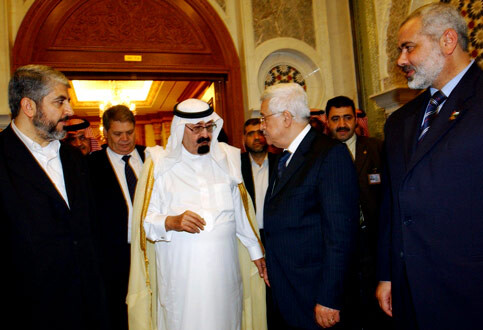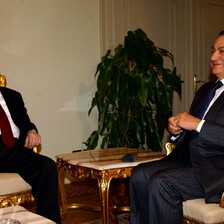Challenge 8 March 2007

Hamas and Fatah delegations headed by Palestinian President Mahmoud Abbas and Hamas leader Khaled Mashaal meet with Saudi Arabia’s King Abdullah in Mecca, Saudi Arabia, 7 February 2007. (MaanImages/POOL/PPO)
“ONLY Saudi diplomacy has succeeded in bearing the historical responsibility for all parties, gathering the warring brothers in Holy Mecca and extinguishing a fire that could have burnt everyone.”
Thus, on February 14, 2007, Turqi al-Hamad praised the Saudis for brokering an agreement between Hamas and Fatah, pulling them back from the brink of civil war. Al-Hamad writes for the pro-Saudi daily, al-Sharq al-Awsat, so his tribute comes as no surprise. At first glance, indeed, the Mecca Agreement may seem a great wonder, considering what we published here two months ago. We divided - and still divide - the Middle East into two axes. One included the US, Saudia Arabia and Fatah, and the other included Iran, Syria and Hamas. Under these circumstances, how was agreement possible? The answer lies in a temporary conjunction of interests between Saudi Arabia and Iran. When we unpeel a few layers, however, the dovish feathers fall away: the Mecca Agreement is a mere time-out - not the basis for a new beginning.
What is the “temporary conjunction of interests”? Again, Iraq! Riad and Teheran, representing the Sunnis and Shiites respectively, are both interested, each for its reasons, in an American withdrawal. Iran then stands to become the main influence in Iraq, given the Shiite majority there. Both the Iranians and the Saudis worry that Iraq cannot be brought under control as long as the Americans are present. There is the growing prospect of an all-out Sunni-Shiite war that could inflame the region. An orderly American pullout, both nations hope, would keep the ethnic conflict confined and under control.
The Saudis want Iranian support for an arrangement that will take account of Sunni interests in Iraq. In exchange, they are willing to smooth down the two conflicts in which they have a say: in Lebanon and Palestine. This was likely the background of a series of recent meetings between Prince Bandar bin Sultan (the Saudi national security advisor, a personal friend of the Bush family) and Iran’s top nuclear negotiator, Ali Larijani. However, if Seymour Hersh’s hunches are correct (New Yorker, March 5), beneath its guise as peacemaker - and while Washington turns a blind eye - the Saudis are breeding a fresh crew of Qaeda-like Sunni extremists to match the Shiite nuclear menace. One does not need an atom bomb, we have learned, to bring large buildings down.
The first project of Riad and Teheran was to settle the Lebanon conflict. Under their joint pressure in the last two months, Siniora has agreed to raise the proportion of Hezbollah representatives in his government to one third, enough to give them veto power. Hezbollah, for its part, has agreed to the establishment of an international tribunal that will investigate the 2005 assassination of Rafiq Hariri. Syria, the prime suspect, opposes the tribunal, so it no doubt feels betrayed by its old friends, Iran and Hezbollah.
As for the bloody strife between Hamas and Fatah, here the Saudis mounted the best show in town. The Mecca Summit based its format on Camp David and Shepherdstown; each were billed as a last ditch effort, with terrific momentum leading up to them. They failed, however, whereas in Mecca no hint of possible failure was allowed. The final terms were established in advance. Even Syria blessed the outcome, hoping that the Saudis would put in a good word for it with the West.
The agreement itself, which is the basis for a Palestinian unity government, is extremely misleading. At the head of the unity government will be the present PM, Ismail Haniyeh of Hamas, but his deputy will be from Fatah. Hamas will have 9 ministers and Fatah 6, but there will also be 5 independents and 4 from other parties. The Finance Minister will be the universally respected Salam Fayyad. The Interior Minister, who has yet to be agreed on, will be from Hamas’s list of independent candidates. Hamas retained its position of not recognizing Israel, but it accepted the earlier agreements signed by the PLO. It refused to say it would adhere to them, as Fatah wanted, but on the other hand it gave up a clause it had always included before: that it would only recognize those agreements “which serve the Palestinian people.” Both sides promised not to slide again into conflict. Both felt the harsh criticism coming from the Palestinian street.
On the surface - but only there - it looked as if Hamas had come out ahead:
1. From the moment of its election in January 2006, Hamas wanted a national unity government with Fatah, but the latter refused, thinking it could undermine the Hamas regime by getting the West to withhold funds. Now Fatah has given up this ambition.2. The formulas of the Mecca agreement contain no essential concessions by Hamas. (Israel can claim that the Quartet’s demands have not been met.)
3. Because the accord was signed at Mecca, Hamas receives pan-Arab legitimacy for its position. The Saudis will pressure the West to recognize the new government. Moreover, the latter can now receive a billion dollars in funds from the Arab league.
All this, as said, is appearance. In Mecca both sides swept differences under the rug. The real test of their unity will come when their government is pressed to accept the conditions set by the Quartet and Israel. It must do so to unfreeze the West’s donations. Hamas cannot govern without this money, the lack of which triggered the clashes. To get it, however, Hamas will have to go along with the line that seeks accommodation.
Here, once again, Hamas reveals a characteristic lack of consistency. We saw this first a year ago, when it chose to take part in elections that were based on an infrastructure provided by the Oslo Accords. It accepted the Oslo framework without the content. Now it deepens its entrapment by entering a unity government, hoping to gain Western funds without accepting Western conditions. Saudi Arabia has won a brief span of glory, but what about the Palestinian people?
Certainly, there’s no question as to the horror of the bloody scenes we witnessed between Fatah and Hamas. They occurred in utter opposition to the popular will. The Palestinian street rejoiced sincerely over the Mecca Agreement.
The problem, however, is: unity for the sake of what? The Oslo Accords did not establish the basis for a true Palestinian state, rather the mold for a state dependent on handouts: a donations state, which would serve Western and Israeli interests. From the beginning, the donations were intended to finance a political entity composed of corruptible, docile elitists like those in other Arab regimes. The Palestinian Authority, under Fatah leadership, wasted a whole decade without establishing an infrastructure and without creating real jobs. It purchased quiet by handing out cash in paper bags to the workers of a bloated public sector.
The election of Hamas did not bring a change of direction. Even if we acknowledge that the movement is not corrupt, it offered no alternative to the donations state. On the contrary, the notion of charity rather than work is a principle of the Hamas movement. Now this notion has become the basis of the entire unity government. Unless the latter can thaw Western coffers, the streets will again erupt.
Thanks to Mecca, then, the situation of the Palestinian people has become even more entangled: its leaders in both Hamas and Fatah have bound it more strongly to the regional interests of the US, Saudi Arabia and Iran. The particular Palestinian problems will have to wait for a different balance of forces.
The war between Fatah and Hamas created a superfluous conflict, whose settlement puts the ball in Hamas’s court. The demands will now be on Hamas, not Israel, especially the demand to release abducted Israeli soldier Gilad Shalit and to stop the Qassam rockets. Furthermore, Israel and the US can now apply all their weight in getting Hamas to meet the Quartet’s conditions: to disband terrorist organizations, to abide by former agreements, and to recognize Israel.
These things happen at a time when many of the senior leaders in Israel are mired in scandals of sex or corruption. The tie between money and politics is deepening social gaps. The immorality of Occupation has spread to all walks of life. The last shadow of a political agenda (the Convergence Plan) disappeared in the summer’s Lebanon war.
We should not wonder that Israel, having bound its fate to America, would display political shortsightedness and a lack of social sensitivity. What is worrisome, rather, is that the Palestinian people, having suffered so long, hitches its interests to the wagon of the Saudi kingdom, instead of cultivating, from within itself, an alternative voice that will reflect its needs. Between the corrupt Arab regimes and the path of Islam, a third way must be found, secular and realistic, that will rebuild the society on a new class basis. National unity, yes, but not for the sake of a donations state, rather for the sake of a state that can achieve Palestinian rights! Only a self-reliant state, based on a viable economy, will pull the rug from beneath the feet of the bully next door.
CHALLENGE is a bi-monthly leftist magazine focusing on the Israeli-Palestinian conflict within a global context. Published in Jaffa by Arabs and Jews, it features political analysis, investigative reporting, interviews, eye-witness reports, gender studies, arts, and more. This article first appeared in Challenge #101 and is reprinted with permission.
Related Links




